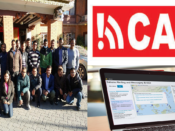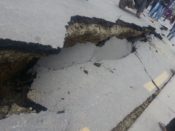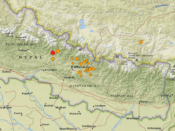Category: Disaster Response
-

Sahana EDEN Used for COVID-19 Responses
Sahana EDEN is an open source disaster management application enabling effective coordination and resource management, particularly in a coordinated multi-agency response. The primary use cases for Sahana EDEN have been for managing fires, floods and hurricanes, but the tool has also been extended for pandemic management with a contact tracing feature originally developed for Ebola…
-

Building capacity on Common Alerting Protocol for Nepal
Department of Hydrology and Meteorology (DHM) Nepal is in the process of operationalizing the Common Alerting Protocol (CAP) v 1.2 – enabled Sahana Alerting and Messaging Broker (SAMBRO): DHM Nepal Warning and Situational-Awareness System. I have been working closely with friends from DHM in helping to get the system up and running. DHM is expected…
-

Major German Broadcaster to German Federal Government: Use Sahana for Refugee Data
German volunteers using free/libre/open source Sahana software are successfully managing refugee information in Manheim, Germany while the German Federal government, using antiquated proprietary software, are struggling with the issue. The juxtaposition between the success of volunteer managed Sahana systems and the failure of myriad of Federal and local systems is so stark that major German…
-

Sahana Nepal Earthquake SitRep 3
The Sahana Software Foundation has deployed an instance of the Sahana Open Source Disaster Management Software server to provide a flexible solution for organizations and communities to respond to the Nepal Earthquake: http://nepal.sahana.io/ Please contact sahana-nepal-response@sahanafoundation.org with questions or to request support or additional features. If you want or plan to use our software please provide some…
-

Sahana Nepal Earthquake SitRep 2
We have been stepping up our coordination efforts and engaging with folks in Nepal and from around the world who are interested in using Sahana to support the response to this devastating earthquake. Arun Pyasi is currently in Nepal and has been working with members of the Free and Open Source Nepal Community to start collecting data on organizations,…
-
Sahana Nepal Earthquake SitRep 1
As you are probably aware a 7.8 magnitude earthquake has struck Nepal on 25th April causing 2,288 deaths and injuring over 5,500 people [1]. Sahana is already being used in Nepal by both the Nepal Red Cross Society and the National Emergency Operation Center (NEOC) of the Ministry of Home Affairs (for more information see the Sahana Nepal Deployments…
-
Using Sahana to Support Volunteer Technical Communities
There’s a lot of similarities between traditional disaster management organizations and volunteer technical communities such as Sahana’s – especially when you look at our operations from a information management perspective. We collaborate on projects with partner organization, often breaking the work down into tasks that are worked on by numerous people. For this reason we’ve been…
-
Sahana’s Ebola Response
In August the World Health Organization (WHO) declared the Ebola outbreak in West Africa as an international public health emergency. Although media attention to the outbreak has decreased, the number of people who have died from Ebola (6,856 to date) continues to grow. Unlike most natural disasters where there is an initial death toll which then…
-
Sandy, Sahana and Sarapis
THE FOLLOWING POST FROM JANUARY 2013 IS REPRINTED WITH PERMISSION FROM THE SARAPIS FOUNDATION. When “Superstorm Sandy” hit New York City on October 30th, dozens of relief organizations, hundreds of grassroots groups and thousands of people mobilized to provide aid to those most affected. The challenge of coordinating such a relief effort was felt by…
-
Occupy Sandy’s FLO Databases
Have you ever been working on a spreadsheet and found that you just couldn’t get all the information you wanted into it? Have you ever looked at the horizontal and vertical cells and wished there were—somehow—a third dimension that gave you the ability to define more stuff? Well, that’s what databases do: they provide you…
